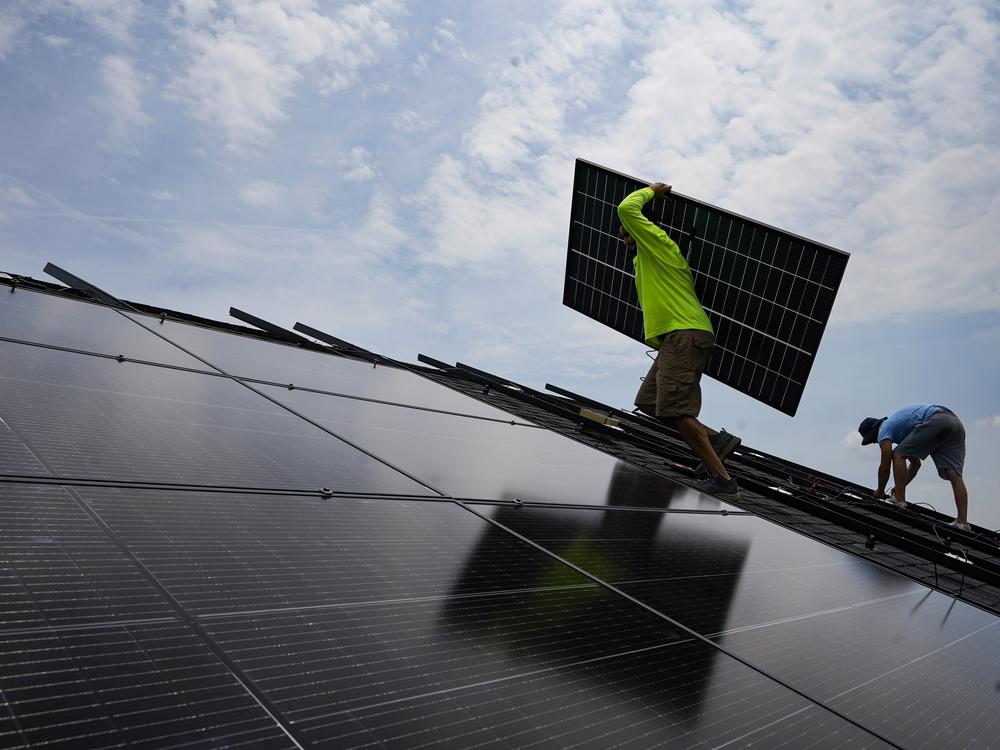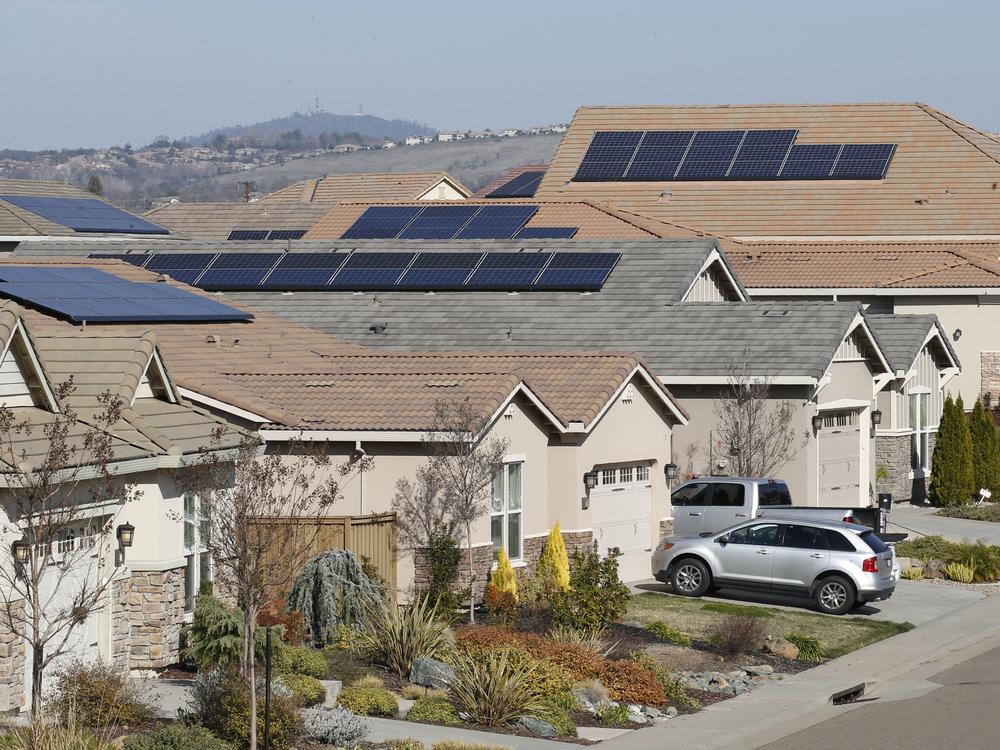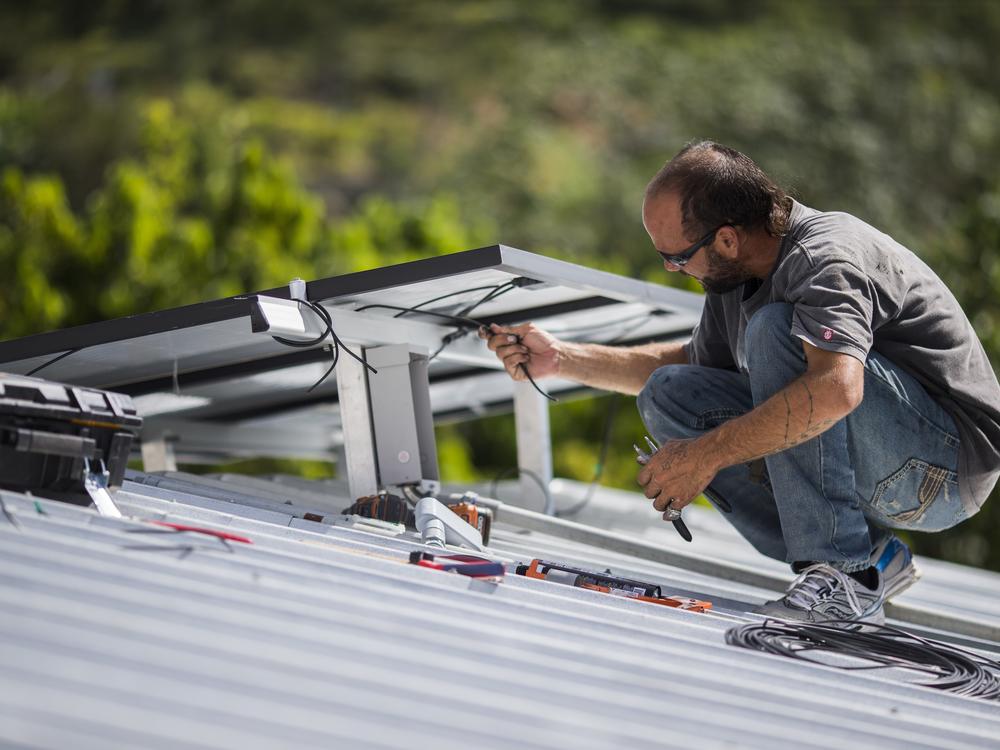Section Branding
Header Content
Rooftop solar has a fraud problem. The industry is working to build back trust
Primary Content
PHILADELPHIA — The solar power industry is booming and that growth helps the world meet its climate goals by replacing fossil fuels. But an emerging problem in the U.S. solar business that installs panels on homes risks slowing the effort to cut the country’s emissions.
Customer complaints against the country’s residential rooftop solar industry have increased dramatically in recent years. One-star ratings on Solar Reviews increased more than 1,000% since 2018. Across the country, prosecutors are investigating high-pressure sales tactics and misleading financing arrangements. Some customers say they were victims of fraud and forgery. This threatens rooftop solar’s impressive momentum. Now, some solar companies are working to repair the industry’s reputation.
“There have been a lot of shady business practices in residential solar. And I think it's hurting the market,” says Micah Gold-Markel, who founded the company Solar States in 2008. He says the solar industry started with, “hippies who looked at the idea of getting electricity from the sun and had very pure intentions” and wanted to make that clean electricity available to everyone.
But now Gold-Markel says larger companies with more of a profit motive have introduced questionable sales and financing practices that are hurting the industry’s reputation.
Even prosecutors who are investigating companies across the country say a good idea has been corrupted.
“We think that having rooftop solar is good for the environment and does save people money. We don't want people deceived, though,” says Adam Welle, a lawyer with the Minnesota Attorney General's Office who is pursuing a case against solar financing companies.
Beyond the industry’s reputation, real people – many of them already financially vulnerable – have been hurt.
“I will die before I could pay this off”
Ninety-one year-old Emanuel Minto’s Northeast Philadelphia house has a tidy front yard, where the Jamaican immigrant proudly flies an American flag. On his roof there are solar panels. They generate electricity but also have become a source of frustration for the retired machinist.
In December 2022, Minto says a door-to-door salesman approached him about a government program to help senior citizens save on their electric bills.
“Well, everybody wants a cheaper electric bill, right?” Minto says.
“‘This program is going to cost about $20,000 out of your pocket, but don’t worry about it, you’re only going to pay about $100 a month,’” Minto says the salesman told him. The cost would be over 20 years, and Minto says the salesman told him it would cut his electric bill in half. “So I said, ‘Well, that would be good.’”
But there was no such government program, and the monthly payments ended up being four times what Minto says he was promised. “I will die before I could pay this off,” Minto says.
Minto didn’t have a computer or an email address and says the salesman created an email and then forged his signature onto an electronic contract.
“Him sit right here,” says Minto, referring to the salesman and pointing to a chair on his enclosed front porch, “and said, ‘This is your email address and this is your password.’” Minto says he never saw or signed an electronic contract.
According to a lawsuit filed against the companies involved, the contract was discovered later when Minto’s granddaughter got access to the email. His attorney says the only messages in the inbox were from the solar installer and the financing company.
“I wish I could say it was surprising,” says Andy Milz, an attorney who specializes in solar fraud and who is representing Minto. “We've seen so much of this.’”
Milz says as part of the loan, a lien was placed on Minto’s paid-for home to secure a nearly $50,000 loan. “Part of the scam here, especially when it comes to elderly consumers, is to strip equity from their homes – to steal their nest egg from them.”
The salesman no longer works for the solar sales company Graysquare Solar. Owner Tim Koontz disputes many of the facts in the case, though he confirms the salesman created the email address. He says there are safeguards in place to prevent what Minto claims happened. And he accuses the elderly Minto of scamming him.
“I feel like I'm the one being defrauded. I feel like this is a hustle to try and get money,” Koontz told NPR. He says the case likely will bankrupt his company.
Milz says Graysquare Solar didn’t even appear in court to defend itself, “Actions speak louder than words.”
The finance company involved in the Minto case, Solar Mosaic, said in an email, “We dispute the allegations and cannot comment further due to pending litigation.”
Milz says in cases of fraud, he generally tries to get mandatory arbitration clauses voided and move the case to a regular court before a jury. But that process could last years and given Minto’s age, he’s pursuing arbitration to get it resolved as quickly as possible.
Milz says he’s handled more than 100 cases like this, and he’s part of a loose network of attorneys around the country who specialize in fraudulent solar sales.
As complaints against solar companies mount, state attorneys general are also getting involved.
Complaints grow faster than installations
In online forums like Reddit, there’s a constant stream of complaints and requests for help from dissatisfied residential solar customers. Part of the reason is that many customers who feel victimized don’t know where to turn.
“There's not really one place for consumers to complain to,” says Jenifer Bosco, an attorney with the National Consumer Law Center. “If they do have a problem with solar companies, they can complain to the Federal Trade Commission. They might complain to the Consumer Financial Protection Bureau, they might complain to their state AG's office.”
That makes it difficult to identify the exact number of complaints against residential solar companies. But it’s clear the number of dissatisfied customers has increased faster than the industry’s healthy growth rate.
Loading...
Complaints to the Federal Trade Commission’s ReportFraud.ftc.gov that contain the word “solar” increased four-fold over as many years. One-star ratings on Solar Reviews increased more than 11-fold. That is much higher than the two-and-half-fold increase in residential solar installations.
The Consumer Financial Protection Bureau recently warned solar customers about hidden fees, and misleading statements about the financial benefits of solar.
“The Minnesota Attorney General's Office, like a lot of AG's offices, has received a large volume of complaints in the last few years from consumers about misleading, deceptive, high pressure tactics by certain companies selling rooftop solar panel systems,” says Adam Welle, assistant attorney general.
In July, Connecticut Attorney General William Tong sued SunRun, and two smaller companies it worked with, alleging deceptive, unfair and illegal sales of solar power systems.
“The complaints we have seen—including forged signatures, impersonations of consumers, non-permitted work, and non-functioning systems—are beyond shocking,” Tong said in a statement.
In one case, the complaint says sales people signed a household up for a 25-year solar lease even though a father and daughter had both said no to the proposal. Tong’s office says the sales people used a false signature on an electronic contract and impersonated the customer on the phone.
Bright Planet and Elevate Solar, two firms sued by Tong’s office, did not respond to NPR requests for comment. SunRun says in a statement to NPR, “In these instances, the sales representatives and installation crews allegedly did not meet our expectations, which we are addressing through the lawsuit and otherwise.”
Minnesota is suing firms who finance solar power systems for homes. The case alleges that four lending companies deceived customers with hidden, upfront fees in exchange for lower interest rates.
“It's misleading people about the price of the system and misleading people about the price of financing,” says Assistant Attorney General Welle. “People have a right to know what are the costs of all these things involved. What's the cost of the system [and] what's the cost of me taking out a loan.”
One of the companies, GoodLeap, wrote in a statement to NPR that these fees are used in several industries, including auto financing.
“The practice is regulated by the Truth in Lending Act, which GoodLeap complies with, and we look forward to demonstrating our compliance in court,” wrote Jesse Comart, chief marketing and communications officer.
The three other companies being sued by the Minnesota AG, Dividend Solar Finance, Sunlight Financial and SolarMosaic, disputed the allegations but declined to comment specifically on the allegations.
In some cases Welle reviewed, he says the fees are so high they violate Minnesota’s usury law, which caps interest rates on loans.
Statistics from solar marketing firm EnergySage show that for the last half of 2023, fees for the most popular loan averaged 47% of the cost of a rooftop solar panel installation. That can add thousands of dollars to the cost of a solar panel system.
“We never had a dealer fee that high. That would have made me sick,” says Gold-Markel. He says his firm Solar States stopped offering loans with hidden upfront fees. “There were all sorts of restrictions that the lenders were putting on us, where we couldn't talk about the dealer fees, which is absolutely crazy.”
Raising residential solar business standards
Gold-Markel is among a few installers around the country involved in a cooperative called Amicus Solar. It pools resources for independent solar companies so they can compete against the large ones. It also requires members to follow certain business practices.
“We're treating our employees fairly. We're looking at the supply chain and saying, are there unethical things happening in the manufacturing side of things? And we're trying to stay away from forced-labor solar panels, that sort of thing,” Gold-Markel says.
For lending, Amicus members steer customers toward lenders, like Clean Energy Credit Union in Colorado, that don’t offer programs with hidden upfront fees.
Others in the solar industry have signed onto a service called Recheck, which will allow “companies to vet sales partners, prevent poor practices by unregistered salespeople, and identify individuals with a history of consumer protection violations who try to move from company to company.”
While Recheck’s registry isn’t intended for consumers, anyone who has a sales person’s Recheck identification number can look them up.
A new federal program, called Solar for All, offers solar to low-income households. To avoid “unscrupulous characters,” the Environmental Protection Agency plans to fund efforts to create lists of reputable solar installers who participate in the program.
And the trade group Solar Energy Industries Association (SEIA) is taking on the reputation issue by developing standards member companies can agree to follow.
“We want to make sure that there are no exploitative or unfair sales practices happening in our industry,” says Abigail Ross Hopper, SEIA president and CEO.
The accredited standard will outline training requirements for solar salespeople and ensure customers have the information they need to make an informed decision.
“They [the standards] will have important rules around disclosing all the information about how you compare energy prices, how you talk about savings with regard to solar installation, what the long-term benefits are [and] what the long-term costs may be,” Hopper says.
SEIA is currently accepting comments on the proposed standards and expects to finalize them this Fall.
“Solar is the most popular form of energy and we are very committed to keeping it that way,” Hopper says.
Considering roof top solar? Here's what to consider and how to protect yourself



